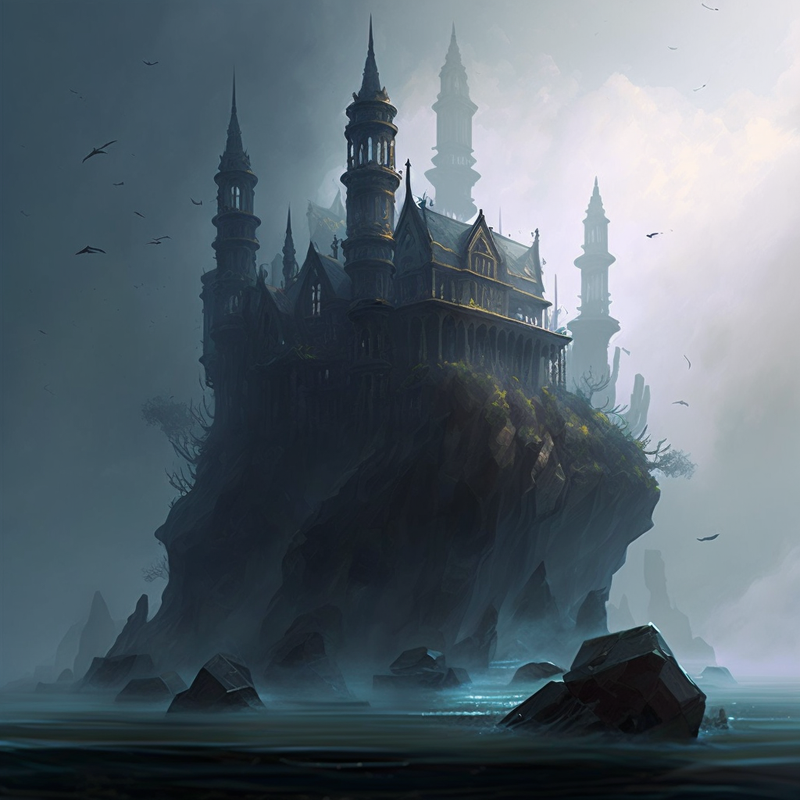

Das Volk des Königreiches Asgoran ist ein Volk von Händlern und Seefahrern. Direkt am Rande des östlichen Ozeans gelegen herrscht hier oft eine steife Brise, obgleich das Klima ansonsten eher gemäßigt ist. Das Volk der Asgoraner besteht seit etwa 500 v.EC und hat aufgrund seines vielfältigen Handels Kontakt zu fast allen bekannten Reichen. Die Sprache der Asgoraner, Asgal ist gleichermaßen auch die Sprache, welche nahezu überall auf Tirakan verstanden wird.
Die Geographie Asgorans
Asgoran liegt auf den Inseln im Osten des Felsenmeeres, und im Norden des Königreichs Hadewalds, Nordöstlich der Zwergengebirge. Die Inseln sind von dichten Wäldern bewachsen, während der südliche Teil vor Hadewald von einer Auenlandschaft milden Klimas geprägt ist. Asgoran verfügt über einige wenige große Gebirge auf den Inseln Lerca und Taris, sowie auf der Halbinsel Tulan. Auf der Insel Seethlan gibt es einen großen alten Vulkan, der, auch wenn er seit Jahrhunderten nicht mehr ausgebrochen ist, immer noch aktiv ist. Besonders in den grauen Riesen, dem Gebirge auf der Halbinsel Tulan, fördert Asgoran wichtige Erze im Untertagebau. Die Wälder der Inseln liegen in gemäßigten Klima und sind äußerst fruchtbar.
Auf der Insel Linya wird zusätzlich die seltene Pflanze Totenmohn angebaut, die zum Aufbau mächtiger Rituale und Tränke dient, jedoch nur auf Linya wächst. Versuche, die Pflanze in anderen Teilen Asgorans zu kultivieren, blieben erfolglos, auf Linya jedoch wächst sie besonders gut. So besteht ein Großteil des Handels, der von Linya ausgeht, aus Totenmohn.
Provinzen: Linya, Lerca, Seethlan, Taris, Westheim, Thenon, Feldmark, Feransmark, Sorenwalde, Hohenfels
Die Geschichte Asgorans
Freie Handelsgemeinschaft (um 500 v.EC)
Um das Jahr 500 v.EC schließt Balwin von Lothenstein die Händler der Region Asgoran zur Freien Handelsgemeinschaft zusammen. Untereinander werden keine Abgaben verlangt, es entsteht ein frühes freies Handelsgebiet. Die größeren Städte Thenon, Tirving und Lerca verfügen über lokale Gerichte, die durch die Stadthalter gestellt werden.
Yadosische Eroberungen (402 v.EC)
Truppen aus Elentrea fallen unter König Berthold von Donnerbruch in Asgoraner Gebiet ein und besetzen die Städte Thenon und Tirving sowie die Provinzen Sorenwalde, Hohenfels, Düsterwald (welches später in Feransmark umbenannt werden soll), Feldmark und Westheim. Die Freie Handelsregion Asgoran wird zu Yadosischem Staatsgebiet unter der Herrschaft der von Donnerbruch. Tirving wird zur Provinzhauptstadt ernannt, Berthold von Donnerbruch lässt hier in kürzester Zeit einen prunkvollen Provinzpalast erreichten. Sein Amtssitz bleibt weiterhin Elentrea/Bayard, in Asgoran vertritt ihn seine Cousine Joan von Donnerbruch.
Erster Yadosisch-Asgoraner Krieg (345 v.EC)
Unter der Führung vieler Reedergemeinschaften aus Thenon bildet sich eine Widerstandsgemeinschaft, die schnell zu einer organisierten, bewaffneten Revolte gegen die Herrscher aus Elentrea anwächst. Ausgehend von der großen Stadt zieht eine Gruppe von 200 Bewaffneten nach Tirving aus, die jedoch auf dem Weg durch die Regionen schnell auf über 1000 Mann wächst. In Tirving schließen sich unverhofft die - bis dahin den Regenten in Elentrea unterstellte - I. und II. Legion der Asgoraner schweren Infanterie den Aufständischen an, und so kommt es ohne weitere Verhandlungen zum ersten Yadosch-Asgoraner Krieg. 15 Jahre währen die aufzehrenden Kämpfe um die Regionen im Südwesten Asgorans. Etwa 40000 Asgoraner sterben in dieser Zeit, die Verluste auf der Seite Elentreas liegen den Berichten zufolge noch darüber.
Der Wiesengrund-Vertrag (330 v.EC)
Nach 15 Jahren des Krieges sind sowohl das ehemalige Asgoran als auch das sowieso bereits verwüstete Elentrea wirtschaftlich weit von den neuen Reichen Meridian und Yavon abgeschlagen. Ein Großteil des Heers aus Elentrea steht in Düsterwald und Hohenfels, während die Al Bah Ji'Ra im Süden für beide Länder eine Bedrohung darstellen. Im Haumond des Jahres 330 v. EC einigt man sich schließlich darauf, im kleinen Ort Wiesengrund nahe Bayard Verhandlungen für eine Beilegung des Konfliktes aufzunehmen. Der Asgoraner Reedersmann Visborn von Lothenstein aus der Familie des Balwin verbringt vier Wochen zusammen mit zweien seiner Vertrauten bei König Jaques von Donnerbruch auf dessen Jagdschloß in Wiesengrund. Nach der Zeit verkündet Jaques von Donnerbach in Bayard die Souveränität des Asgoraner Gebietes. Der Preis für die Freiheit der Handelsleut ist das Einsetzen eines Königs Elonar DeCreston, aus der gleichnamigen Familie aus Bayard. So wird das erste Königreich Asgoran ein Reich unter Regentschaft Elentreas. Zu diesem Zeitpunkt ist allerdings schon abzusehen, dass Elentrea keine gute Zukunft haben wird. Ein eingerichteter Handelsrat soll die Sicherheit des Reiches festigen und die Gesetze des Handels von der Rechtssprechung trennen.
Die Schwarze Pest (250 v.EC)
Als im Jahr 255 v.EC die Pest in Yavon ausbricht, glaubt man in Asgoran nicht an die Gefahr der Seuche. Das Haus DeCreston hatte für Wohlstand und Ruhe in der Bevölkerung gesorgt, wenn auch zum Preis einiger geschätzten Freiheiten. So wurden die Bürgerwehren und Stadtgarden zugunsten des - Yadosisch geführten - Heeres abgelöst, und die Abgaben des gewöhnlichen Volkes wurden direkt dem Adel zugeführt, ohne dass die Städte und Provinzen in ihrer Struktur erweitert wurden. Als dann im Schneemond die ersten Kranken in Tirving von der kommenden Seuche zeugten, stand das junge Asgoran dieser völlig schutzlos gegenüber. In den kommenden Jahren der Pestilenz starben große Teile der Stadtbevölkerung, den Berichten zufolge weit mehr als im Benachbarten Yadosien, welches von der Seuche zum Großteil verschont blieb. Erst zwanzig Jahre später gewann man die Kontrolle über die Krankheit.
Der Kessel von Thenon (211 v.EC)
Am Vorabend des neuen Jahres kommt es zu einem Attentat auf Elonar II. DeCreston, welcher den Anschlag leicht verletzt übersteht. Der Hintergrund des Angriffs konnte nie geklärt werden, da der Meuchler bei seiner Tat getötet wurde. Elonar jedoch nutzte die Gelegenheit, einen Grund für einen geplanten Angriff auf die Asgoraner Handelsflotte zu finden. Auf Thenons Handelsgilde hatte er es seit seinem Amtsantritt abgesehen, nachdem die Abrechnungen seines Vaters offenbarten, wieviel Gold am Königshaus vorbei durch die Reedereien ging. Keine zwei Wochen nach dem Anschlag lief die Asgoraner Kriegsflotte vor Thenon auf, wo in einer einzigen Nacht die Hälfte der Handelsschiffe versenkt wurden. Bemühungen, den Angriff als fremden Überfall erscheinen zu lassen, fruchteten nicht. Diese Blutnacht wurde im Nachhinein als "Der Kessel von Thenon" bekannt.
Zweiter Yadosisch-Asgoraner Krieg (211 v.EC)
In den folgenden Monaten kam es vermehrt zu Unruhen, bei denen das Yadosisch-Asgoraner Heer mehr und mehr zwischen die Fronten geriet. Schließlich schlossen sich die Infanterie-Legionen den Widerständlern an, während die Asgoraner Kriegsflotte fest in den Händen der Königlichen Familie blieb. Es kam zum Bürgerkrieg, der drei lange Jahre über dem von Hunger und der Pestilenz verwüsteten Asgoran tobte. Diese Zeit, welche für die Reiche jenseits des Felsenmeeres eine Zeit des großen Reichtums war, stellte für Asgoran das dunkelste Kapitel der Vergangenheit dar. Wenngleich die Zahlen der Opfer weit hinter denen der Pest und des ersten Krieges zurückblieben, so waren die Taten jedoch weit grausamer. Morde, Verstümmelungen und Vergewaltigungen wurde auf Menschen unwürdigste Art zum Tagesgeschäft, und die einst große Seemacht Asgoran stellte den Seehandel fast ganz ein.
Der Hohenfelser Friede (208 v.EC)
Elonar II. stirbt im Haumond des Jahres 208 v. EC bei der Belagerung der Hartang-Werft auf Seethlan. Bereits kurz nach seinem Tod kommt es zu Bemühungen des Hauses DeCreston, das Reich in einen gefestigten Zustand zu bringen. Wohl auch aufgrund der Ereignisse in Yadosien wird in der Grafschaft Hohenfels mit der Familie von Lothenstein um eine Erweiterung des Wiesengrund-Vertrages von 330 v. EC beraten. Unter dem Namen Hohenfelser Friede wird schliesslich ein Vertrag ausgehandelt, der den beiden Familien von Lothenstein und DeCreston jeweils die Königskrone auf Lebenszeit eines Herrschers zuspricht. König Feran I. von Lothenstein ist der Regent, welcher das gebeutelte Reich wieder in ruhige Zeiten bringen soll. Ferans erste Handlung als König besteht darin, die Stadt Thenon als Hauptstadt des Königreiches Asgoran wieder aufbauen zu lassen.
Ferans Tod (150 v.EC)
Am 20. Obstmond des Jahres 150 v. EC. stirbt König Feran I. von Lothenstein im chronar'schen Alter von 89 Jahren. Er hinterlässt ein Asgoran, in dem die beiden ehemals verfeindeten Kulturen sich näher gekommen sind, als dies je gehofft wurde. Asgoran ist auf dem vorläufigen Höhepunkt seiner Handels- und Seemacht, die die Stärke des konkurrierenden Meridian zu dieser Zeit weit übersteigt. Asgoraner Handelsposten, Werften und Reedereien sind in fast allen größeren Städten am Felsenmeer zu finden, darunter auch Bayard. Die Asgoraner Sprache Asgal gilt seit dieser Zeit als erste Handelssprache. Erst 150 Jahre später sollte das schwer geschundene Meridian wieder aufschliessen, und im Jahre 17 EC nach einem Angriff der Gas'Danir auf einen Konvoi Asgoraner Handelsschiffe mit Asgoran einen Pakt zur Bekämpfung der Piraten im Felsenmeer eingehen.
Gesetz und Politik in Asgoran
Über die Wirren der Jahrhunderte fand sich in Asgoran das Lehnswesen als gangbarer Weg für die Regenten. So wurden die von Lothenstein und DeCreston als Vasallen vereidigt, und erhielten im Jahre 177 v.EC von König Feran I. von Lothenstein 13 Herzogtümer als Lehen. Zudem wurde ihnen als Lehen die Rechtssprechung sowie das Recht Vasallen zu vereidigen gegeben. Als Sicherheit begründete Feran I. das Lehnsrecht mit der einleitenden Klausel des Familienstammrechts (Lex Familiari) und des Bürgerstammrechts (Lex Alodium). Nach dem Lex Familiari ist es Bedingung für die Vasallen des Königs, einer königlichen Familie (DeCreston oder von Lothenstein) anzugehören. Da dies nur bis zum zweiten Grad der Königlichen Familie möglich ist, sichert es den königlichen Familien eine gewisse Beständigkeit.
Das Lex Alodium ermöglicht es den Bürgern (und vor allem Händlern), auch im Lehnswesen ihre angestammte Freiheit zu erhalten. Alles, was nicht als Lehen erfasst wurde, gilt als Eigentum des Einzelnen und wird ihm auch auf Lebenszeit zugesprochen. Um das Eigentum zu wahren wurde eine Abgabe eingerichtet, der Allod-Zehnt, welcher im Volksmund vornehmlich als Alod bekannt ist.
Mit dem Tod des Regenten gehen seine Vasallen auf seinen Nachfolger über. Die Erbfolge wird von den Familien bestimmt, und entzieht sich der Einflussnahme des Volkes. Aufgrund des Hohenfelser Friedens wechselt die Regentschaft jeweils zwischen den beiden Königshäusern. Ein Verfahren, diese Folge und die Wahl des neuen Königs anzufechten gibt es nicht.
Rechtswesen und Rechtssprechung
Das Rechtswesen ist im Lex Alodium definiert und sieht vor, dass die Rechtssprechung gegenüber den freien Bürgern von Vasallen der Herzöge vorgenommen wird. Die Grundlage bilden hier fünf Regeln, die Untaten in Klassen einordnen, von der Kerkerhaft bis hin zum Tod durch das Enthaupten. Der Strick bleibt an dieser Stelle allein den Seefahrern vorbehalten. Desweiteren spricht das Bürgerstammrecht den Freien das Recht zu, in jedem Fall vom Lehnsherren des Richtenden angehört zu werden, sollte er seiner Ansicht nach zu Unrecht beschuldigt werden. Normalerweise spricht ein Vasall der Herzöge Recht in den Städten, jedoch kann ein Gericht über einen freien Bürger oder Händler so bis vor den König getragen werden.
Die Bediensteten und Eigenen der Grundbesitzer werden in dieser Rechtssprechung nicht beachtet, und fallen somit unter das Recht der jeweiligen Grundbesitzer.
Bündnisse und Kontakte
Asgoran unterhält seit langer Zeit verschiedene Kontakte zu anderen Reichen. Hauptsächlich handelt es sich dabei um Handelsabkommen, die - trotz verschiedener Angrifsssituationen - auch über Kriege hinweg bestand hatten. Besonders hervorzuheben ist der Pakt mit Meridian nach der Seeschlacht von Thaneb im Jahre 37 v.EC. Dieser wurde geschlossen um die Seewege des Felsenmeeres zu sichern, nachdem die Kriegsflotte Meridians einem Asgoraner Konvoi vor Thaneb zur Hilfe kam, als diese von den Piraten Gas'Danirs angegriffen wurden.
Das Leben des Volkes
Die Menschen in Asgoran sind zu einem Großteil freie Bürger. So leben etwa drei Zehnt aller Asgoraner in Städten, davon etwa 200.000 in den großen Städten Thenon, Lachsund und Tirving.
Ein Großteil der Landbevölkerung sind freie Bauern und Fischer, Leibeigenschaft ist zwar vorhanden, jedoch nur in einigen Herzogtümern anzutreffen. Dies wiederum ist eine Freiheit des jeweiligen Herzogs, die beim königlichen Hof lediglich registriert wird.
Ein Teil der Familien, vor allem in den großen Städten, ist in der Zeit nach den Kriegen beachtlich reich geworden, und nun gibt es eine große Zahl an reichen Reederern und Händlern, die die Aufrechterhaltung der königlichen Autorität beträchtlich erschwert, teils durch politischen Einfluß, teils durch Bestechung und Korruption. So fallen diese wohlhabenden Freien unter das Lex Alodium, welches ihnen weitgehende Rechte zuspricht.
Die Asgoraner waren ursprünglich ein Volk von Fischern, was auch heute noch zu sehen ist. Besonders im Reich der Inseln, dem nördlichen Teil Asgorans, besteht der Hauptteil der freien Bürger aus Fischern. Auf der Insel Taris, im Norden, bestimmen Bauernhöfe das Bild. Dort wird nur an der Küste Fischerei betrieben. Binnenfischerei gibt es in Asgoran so gut wie nicht, jedenfalls ist es nicht wertvoll für den Handel.
Der Asgoraner Geheimdienst
Neben seinem meridianischen Gegenstück, dem MID, ist der AIS (Asgoranischer Informations Service) wohl der am Besten informierteste Geheimdienst des Kontinents. Sabotage, Attentate und zahllose Sonderaktivitäten werden ihm zugeschrieben. Der AIS unterhält kein Rekrutierungsbüro, vielmehr spricht er vielversprechende Kandidaten von sich aus an.
Eine der wohl schillernsten Agenten im 6. Jahrhundert ist Jeoffrey Kingsley. Seiner Person werden zahllose Heldentaten zugeschrieben, ein Image welches er durchaus zu pflegen versteht. Legenden besagen, Kingsley sei in seinem Leben mehr als zwölf mal "gestorben". Als Markenzeichen gelten seine Sammlung an magischen Hüten.
Der AIS untersteht direkt dem Königshaus und muss sich letzendlich nur der Krone gegenüber rechtfertigen. Ein Umstand der nicht ohne Kritiker ist, die den AIS als "unkontrollierbaren Geheimbund ohne Transparenz" bezeichnen.
Handel in Asgoran
Seit Asgoran im Jahre 208 v.EC den Frieden wiederhergestellt hat, haben sich die Menschen ganz auf den Handel und den Abbau von Rohstoffen konzentriert. Man fand neue Metalle und Diamanten von großem Wert, und der Handel florierte. So ist Asgoraner Rum zum Beispiel auf ganz Tirakan bekannt und geschätzt. Mit dem Handel von Rum hat sich mancher Händler in Asgoran eine goldene Nase verdient. Hergestellt in Tulans Küstenstädten wird er in vor allem nach Toran und Yavon geschifft und dort immer gern und viel getrunken.
Asgoran hat sich im Laufe der Jahrhunderte seit dem Aufstand eine große Flotte erschaffen. Zum Teil liegt die Handelsflotte in Königlicher Hand, zum Teil sind die Schiffe in den Händen der Händler und Reederer. Asgorans Handelsschiffe werden auf jeder Reise von Kriegsschiffen begleitet.
Asgoraner Handelswaren
- Totenmohn von der Insel Linya
- Rum aus Thenon und von Tulan
- Gold und Kupfer aus der Region um Hohenfels
- Getreide aus Westheim und der Feldmark
- Papier und Papyrus von Seethlan
Die Hauptstadt Thenon
 Thenon ist die Hauptstadt des Königreiches Asgoran, und zudem Sitz des Rates der Magier, dem Vorstand der Magiergilde in Asgoran. Thenon ist eine große Stadt von etwa 95.000 Menschen. Thenon wird nicht umsonst die Stadt des Nebels genannt. Den ganzen Herbst über herrscht hier der Nebel vor. An manchen Tagen zwischen Haumond und Wintermond kann man nicht mal einen Faden weit sehen. Diese Tatsache ist jedoch eigentlich die Unbedeutendste. Ist Thenon doch die Hauptstadt des Königreiches der Inseln.
Thenon ist die Hauptstadt des Königreiches Asgoran, und zudem Sitz des Rates der Magier, dem Vorstand der Magiergilde in Asgoran. Thenon ist eine große Stadt von etwa 95.000 Menschen. Thenon wird nicht umsonst die Stadt des Nebels genannt. Den ganzen Herbst über herrscht hier der Nebel vor. An manchen Tagen zwischen Haumond und Wintermond kann man nicht mal einen Faden weit sehen. Diese Tatsache ist jedoch eigentlich die Unbedeutendste. Ist Thenon doch die Hauptstadt des Königreiches der Inseln.
Einem Reisenden fällt als erstes die riesige Hafenanlage auf, wenn er Thenon mit dem Schiff erreicht. Und das nicht ohne Grund. Er sieht nämlich den größten Hafen Tirakans. Die ersten Wellenbrecher sind schon weit vor der Küste zu sehen, und es scheint unmöglich, den ganzen Hafen zugleich zu überblicken. In Thenon laufen die Handelsverbindungen von ganz Asgoran zusammen, und es herrscht von früh morgens bis spät in die Nacht ein reger Betrieb im Hafen.
Das Wahrzeichen des Hafens ist die Akademie Hardas Lockheist, zwei Meilen vor den ersten Wellenbrechern. Auf einem hohen Riff, inmitten einer meistens bewegten See liegt hier ein tiefschwarzes Gebäude, das das ganze Jahr über in einen magischen Nebel getaucht ist. Von der See her ist nur eine wogende Nebelmasse zu sehen, aus der oben unzählige hohe schwarze Türme herausragen, die keine Fenster haben. Die Akademie ist der Sitz des Rates der Magier und damit zugleich der zentrale Ort der Asgoraner Gilde der Magier. Einem Fremden verrät nur eine kleine Anlegestelle, das diese Insel Menschen keineswegs fremd ist, denn dort findet man immer ein paar Ruderboote. Der magische Nebel rührt von einem Artefakt tief im inneren der Akademie. Sein Geheimnis wird von den Lehrmeistern ebenso gehütet wie sein Name. Bekannt ist nur, daß dieses Artefakt einen ewigen Nebel über die kleine Insel legt, Was es wirklich damit auf sich hat, und wie Ce-Nya, die Titanin des Nebels, ihre Hände da mit im Spiel hat, ist unbekannt.
Eine weitere Besonderheit an Thenon ist die Gilde der Diebe in der Stadt. Gibt es wohl in jeder Stadt eine eigene Gilde, so ist der Verband der Diebe in Thenon doch etwas besonderes. Die Gilde hat in Thenon eine starr festgelegte Struktur, wenn auch der bedeutendste Mann in der Hierarchie noch nie gesehen wurde. Der oberste der Diebesgilde wird von den Menschen Schattenkanzler genannt, und es mag wohl kaum mehr als zwei Menschen geben, die seine wahre Identität kennen. Ihm folgen alle Diebe der Stadt, und wer als Dieb in Thenon nicht der Gilde angehört, der muß sich auf ein hartes Leben vorbereiten.
Zudem kontrolliert der Schattenkanzler teils über die Diebe, teils über noch unbekannte Möglichkeiten, den Fluß der Waren in der Stadt. Kein anderer Mensch in Thenon ist so gut über den Handel informiert wie der Schattenkanzler, und so kommt es, das die Gilde der Diebe den Handel in Thenon nicht schädigen, sondern durch geschickte Manipulationen sogar antreiben.
Die Diebe, die der Gilde angehören, sind keineswegs Assasine oder Eigenbrötler. Sie unterstehen dem Schattenkanzler, und sollte sich ein Dieb gegen den obersten Stellen, so würde er auf der Stelle aus der Stadt verbannt. Blutrünstige Rituale oder Racheaktionen sind den Schatten, wie die Diebe auch genannt werden, fremd.
Die Schatten aus Thenon stehen in einem schon Generationen andauernden Streit mit den Assasinen aus Tirving. Diese werden auf einer Burg, etwa vier Meilen vor Tirving, ausgebildet, um nur für spezielle Aufgaben eingesetzt zu werden. In Thenon ist nicht viel über sie bekannt, doch kann ein Suchender sehr wohl an einem der besonderen Orte, zu denen zum Beispiel das Wirtshaus der Gebrüder van Laarus gehörte, Hilfe von ihnen erbitten. Es sei denn, sein Geldbeutel hat nicht das nötige Gewicht...
